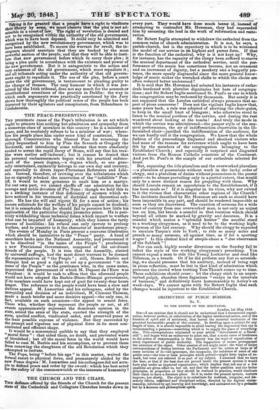THE PEACE-PRESERVING SWORD.
THE proximate cause of the Pope's tribulation is an act which ought to procure him nothing but admiration and sympathy from a numerous class of moralists in this country : be is a minister of peace, and he resolutely refuses to be a minister of war ; where- fore his people place him under some kind of constraint. Those thorough Conservatives who blamed Pius for reversing the policy bequeathed to him by Pius the Seventh or Gregory the Sixteenth, and introducing some reforms that were absolutely needed to arrest the rapid decay of Rome, will say that his trou- bles were earlier self-induced ; but it cannot be denied that his personal embarrassments began with his practical enforce- ment of the peace dogma,—a dogma which, as one gene- rally entertained, eminently belongs to our own day and country, and especially to divers super-Protestant Reformers and Libe- rals. Instead, therefore, of crowing over the tribulations which has so signally rebuked the innovation of the "infallible" Pon- tiff, it would be more generous to exalt him as a martyr. For our own part, we cannot shuffle off our admiration for the courage and noble devotion of Pio Nono : though we hold this to be a striking instance of that deficiency of acumen which we have noticed in his treatment of doctrinal and theoretical sub- jects. He has the will and vigour fit for a man of action; his sincere solicitude for the welfare of his people cannot be doubted; but it is remarkable that he should fail to perceive how little his application of the particular dogma promotes peace. He is posi- tively withholding those technical forms which impart to warfare what can be imparted of humanity, while they hasten the tardy process of hostilities : his refusal can only operate to prolong warfare, and to preserve to it the character of murderous piracy. The events of Monday in Paris present a converse illustration which should be instructive to the " Peace" party. A band of anarchists broke into the National Assembly, and pronounced it to be dissolved "in the name of the People "; proclaiming a new Provisional Government, composed of the soi-disant friends of the people. It is true that the Assembly, elected by universal suffrage, had the most direct warrant to be deemed the representatives of " the People "; still, Messrs. Barbel and Blanqui had as good a right to set up a government " in the name of the People" as the gentlemen who, in the same name, improvised the government of which M. Dupont de l'Eure was President : it would be rash to affirm that the aforesaid people would not have adopted the Barbes-Blanc-Blanqui government, if its members could have kept out of gaol for twenty-four hours longer. The reference to the people would have been a slow and dubious appeal. M. Lamartine and his colleagues, aided by the Intrepidity and decision of an individual, M. Clement Thomas, made a much briefer and more decisive appeal—the only one, in fact, available on such occasions—the appeal to armed force. Those who, whether they represent the people or not, at all events approximately represent the dominant opinion in the state, seized the arms of the state, exerted the strength of the state, quelled conflict, vindicated order, and preserved peace at the least possible expense of violence. But they succeeded by the prompt and vigorous use of physical force in its most con- centrated- and efficient shape. It would be a nonsensical quibble to say that they employed "moral force " : that aided them, no doubt, and prevented waste of. bloodshed; but all the moral force in the world would have failed to oust M. Barbes and his accomplices, or to prevent them from renewing the slaughters of the old Revolution which they attempted to imitate.
The Pope, being " before his age " in this matter, waived the formal resort to physical force, and prematurely abided by the new Peace dogma: M. Lamartine and his colleagues did not scru- ple to defend peace and order by the sword : which has beat acted for the safety of the commonwealth or the interests of humanity ?






















 Previous page
Previous page